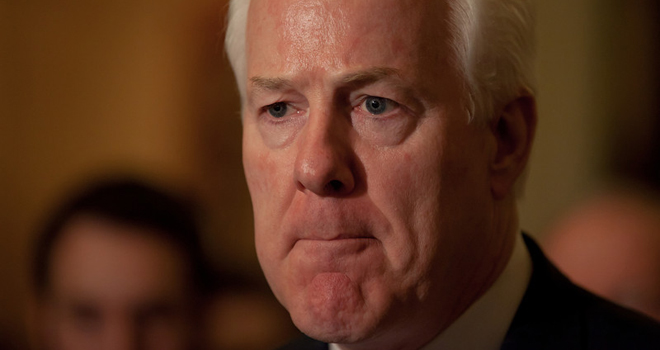Updated at 9:49 a.m. ET, Nov. 7
The results of the 2012 election rolled in more swiftly and decisively Tuesday night than many expected. But the quickest returns — and most disappointing to Republicans — came in a series of Senate races they had once contested or been favored to win.
Beginning on the East Coast and moving rapidly west, Republicans saw their hopes for picking up Senate seats — let alone reclaiming the majority — rapidly destroyed by a cascade of Democratic victories in closely contested states.
First Florida, then Maine, then Pennsylvania, then Massachusetts, then Indiana, then Missouri, and finally Wisconsin and Virginia — all fell into or remained in Democratic hands, and they took Republicans’ ability to claim a significant victory on Tuesday night with them.
The 2012 election was marked most prominently by a bitter but substantive top-of-the-ticket debate between Mitt Romney and Barack Obama.
But an equally important story roiled just below the campaign’s surface — one that ultimately cost the GOP control of the U.S. Senate for a second promising cycle in a row.
“It’s clear that with our losses in the Presidential race, and a number of key Senate races, we have a period of reflection and recalibration ahead for the Republican Party,” said Sen. John Cornyn (R-TX), chair of the Senate Republicans’ campaign committee.
Looking forward from the tumultuous early days of President Obama’s first term, Republicans found themselves, for different reasons, facing three consecutive Senate elections — 2010, 2012, and 2014 — with fundamentals on their side. The financial crisis had left economic ruin in its wake and, with the recovery halting, Democratic incumbents were cannon fodder for a bellicose, conservative electorate.
But the most energized portion of that electorate — the GOP base — was just as determined to oust Republican candidates and incumbents who failed to meet appropriately conservative standards as it was to unseat Democrats. At the district level, where highly ideological candidates can win gerrymandered seats, this prefigured a historic House Republican wave. At the state level — particularly the swing state level — it created enormous headaches for the national GOP, which co-opted the tea party movement, and attempted to convert its energy into partisan policy and electoral gains, but ultimately found itself powerless to prevent its followers from selecting candidates who could not credibly compete.
In the end, Republicans cut down the Democrats’ 59 vote majority to 53 in 2010, but missed golden opportunities to oust vulnerable Democratic incumbents in Nevada (Harry Reid) and Colorado (Michael Bennet), and to defeat Chris Coons, a first-time Democratic hopeful running for Joe Biden’s open former seat, in Delaware. They also squandered a less straightforward opportunity in Connecticut, where troubled Democratic nominee Richard Blumenthal was able to fend off his opponent, professional wrestling executive Linda McMahon.
But for the GOP base’s ideological rigidity, those four races would have thrown control of the Senate to the GOP.
The 2010 midterms were a harbinger for the current cycle. In 2012, Republicans were once again poised for significant gains, squaring off against the vulnerable first-term Democrats who coasted into office in 2006 on the first of two consecutive Democratic waves: Claire McCaskill in Missouri, Jon Tester in Montana, Sherrod Brown in Ohio, Bob Casey in Pennsylvania.
Retiring members of the Democratic caucus also handed the GOP pickup opportunities in North Dakota, Virginia, New Mexico, Nebraska, Wisconsin, and Connecticut, and Republicans had a decent shot of unseating Bill Nelson, a two-term Florida Democrat.
But in state after state, the GOP electorate nominated candidates too conservative to credibly challenge even unpopular Democratic incumbents.
The key moment for the GOP came in mid-August, when Rep. Todd Akin (R-MO) — running against incumbent Claire McCaskill — made controversial and false statements about rape and abortion in a local interview. Those remarks went national on Aug. 19, in a story first reported by TPM.
Republican odds of taking back the Senate collapsed and never recovered.
This wasn’t all Akin’s fault. In Indiana, Republican voters ousted their incumbent senator, Dick Lugar, and nominated tea party favorite Richard Mourdock, who trip-wired his own easy path to Washington when he argued against abortion rights for rape victims by invoking the will of God.
The GOP unexpectedly had to drop money into states like Arizona and Nebraska to ward off tougher-than-expected Democratic challengers in red states. And moderate Republican Scott Brown was unable to hang on to Ted Kennedy’s old Senate seat in Massachusetts, falling to Democrat Elizabeth Warren in one of the most nationally relevant races this cycle.
Likewise, the GOP’s legislative strategy during Obama’s first-term drove popular incumbent Sen. Olympia Snowe (R-ME) into retirement, allowing Democratic leaning independent Angus King to cruise to victory and nab Democrats an unexpected seat.
Taken together with an unexpected victory in North Dakota for Heidi Heitkamp, who held the line against Republicans’ quest to replace retiring Sen. Kent Conrad (D-ND) with one of their own, Democrats actually gained two overall. The 113th Senate will be more Democratic than the 112th, and more liberal overall — a huge disappointment for Republicans who were the odds on favorites to control the Senate, regardless of the presidential outcome, when the cycle began.
That leaves them looking ahead to 2014, when they’ll face down the Dems who won on Obama’s 2008 wave, and have one last chance to take the majority before the odds turn back against them in 2016. But now Dems have a welcome, unexpected, two-seat cushion.











